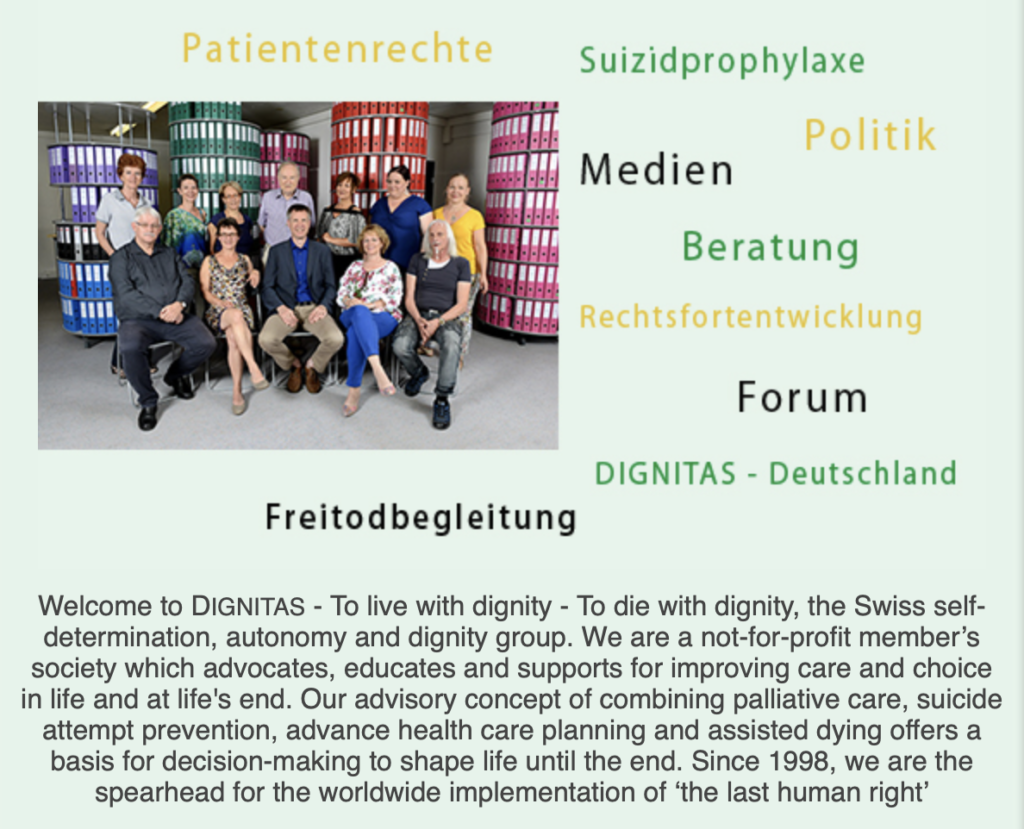
<Trigger alert: this post deals with the history of society considering assisted suicide – please be careful with your own wellbeing. Call the Samaritans on 116 123 or email jo@samaritans.org if you need to talk>
Oddly, the word that comes to mind is Euthanasia. The word originates from the Greek “eu-thanatos“, good death. It started out with an essay written in 1870 by a Samuel Williams in which he suggested that
“in all cases of hopeless and painful illness, the medical attendant was to administer chloroform to destroy consciousness and put the sufferer to a quick and painless death“.
p 20: Samuel Williams, 1870, from ‘The Right to Die‘ by John Wyatt in 2015
This was a result of something that Charles Darwin had published in 1859 which ‘promised the preservation of the hardiest races and of the hardiest individuals‘. This culminated with a lady called Anne Besant, who was a birth control campaigner, writing that we may be permitted to die voluntarily and painlessly, to ‘crown a noble life with a laurel wreath of a self-sacrificing death‘.
All in all, a good death was one that might either be one of removal of the weakest within our society, or to remove pain and suffering from an individual. These are quite different aspirations.
It is whether we are seeking medical killing in terms of ‘compassion’
or from autonomy, the right to direct one’s own life.
Is either a ‘good death’?
Blurring of the boundaries
In the early 1920s some academics (Binding and Hoche) identified 3 categories which ‘allowable killing’; was deemed to be justified, they were those who were: terminally ill, in a coma and deemed ‘incurable idiots‘. They further defined the latter as those who were of the slightest use and an enormous burden upon society.
Germany
The imminency of war in the late 1930s heralded Germany declaring the sterilisation of the genetically unfit, something which sounds so atrocious to our ears but which was seriously debated in the USA, Scandinavia and the UK. So much so, that the Voluntary Euthanasia Society was formed in England in 1935 when the opinion polls suggested that 60%+ supported the legalisation of euthanasia.
Perhaps the circumstances of the day might dictate the ethical position of society, so we can have a ‘good death’?
It was in October 1939 that Hitler signed off the T4 programme, that those considered incurable be afforded a mercy killing. It is suggested (Right to Die, p 31) that up to 275,000 people were killed under this programme alone. The medical staff involved were holding firm to the mantra some “lives were not worthy to be lived”.
Netherlands

Euthanasia came to refer to the active termination of life, conducted by a doctor through a lethal injection. So it is the doctor who administers and ends the life of the person who is in unbearable suffering and hopelessly in pain – at the person’s explicit request. It is voluntary. The doctors had to ensure that: the request was not coerced out of the patient; was rationally defensible; the desire to die was a long lasting one; the suffering was unacceptable and unbearable; and the doctor must consult with an experienced colleague. The condition was not necessarily a terminal illness. In 2015, 3% of all deaths were ones from euthanasia, mostly related to cancer. They were deemed to be ‘assisted suicide’ now.
Note the changing phrasing of death, to allowable killing, to mercy killing, to active termination of life,
to assisted suicide – how you describe it seems very important.
Oregon, USA
Rather than being in unbearable suffering, the criteria here was that it was the right of that person to die in a way they perceived as dignified. So here, it isn’t suffering that is the priority but autonomy – our rights.
Any capable adult (18 years+), resident in Oregon, with less than 6 months to live, can take drugs themselves, that is not assisted by a doctor. An agency, ‘Compassion and Choices‘; can deliver the said medication to your house, where you can keep it for up to a year, before it is collected from you. The rate of occurrence is suggested to be around 0.3%. This is now available in the states of Oregon, Washington, New Mexico , Montana and Vermont.
Switzerland
Many may know of the name of the centre within Switzerland: ‘To live with dignity – To die with dignity’ – known as Dignitas. It has conducted medially-supported accompanied suicides since 1998. They strenuously state that it is only the media which has called them a ‘clinic’. Their ‘work and advisory concept of combining palliative care, suicide attempt prevention, advance directives and assisted dying’ strives to remove their need to exist as it will be available worldwide eventually. You are asked to become a member, prior to any request for their support. The visit to Dignitas can take up to 4 months to arrange. They do not undertake euthanasia but “assisted or accompanied suicide”.

Thirty-three people from the UK went to Dignitas in 2022 to end their lives. The cost was approximately £10,000 each, in addition to the risk of prosecution for anyone assisting or accompanying a loved one, which under the Suicide Act 1961 is a crime with a maximum sentence of 14 years in England and Wales. There is no specific crime of assisting a suicide in Scotland, but it is possible that helping a competent adult to die could lead to a prosecution for culpable homicide.
United Kingdom
It was back in 1961 that the Suicide Act removed the penalties within law for attempted suicide. Impassioned debate continued albeit often focussing upon children with disabilities and the burden placed upon parents in such circumstances. In 1994 the House of Lords reported that no policy could be devised which would allow individual cases to permitted for permitting assisted suicide. It is important to note that this occurred at a similar time when Dame Cicely Saunders was promoting the espial care within hospices, a viable alternative to Euthanasia.
In 2006 Lord Joffe introduced the Assisted Dying Bill, whose aim was to legalise assisted suicide – it was defeated in the House of Lords. Importantly the Voluntary Euthanasia Society then changed its name to ‘Dignity in Dying‘ – note the change in emphasis: euthanasia to dignity.
In Scotland Margo MacDonald introduced an End of Life Assistance Bill. This would allow assisted suicide for those who had a terminal illness or condition and who find their life intolerable. The Bill was defeated.
In 2014 Lord Falconer sought the acceptance of another bill legalising assisted suicide in England and Wales., which was supported by ‘Dignity in Dying’. The Bill was based on his earlier report from 2014 and, importantly where ‘suicide’ was used in the report, it had now been replaced with ‘assisted dying’, allowing that a medical professional could administer lethal medicine to enable a terminally ill person to end their own life.
Emphasis
‘Assisted Dying’ is an interesting combination of words. Whereas dying is part of the normal process, assisted dying implies an intervention which is not normal. The use of certain key words, the removal of the word suicide or euthanasia, can make a significant change in our understanding and possibly our subsequent behaviour.
- Euthanasia is defined as: ‘The intentional medical killing, by act or omission, of an individual whose life is thought to be not worth living’. This intentional killing is seen as a way of allowing the person to ‘die quickly, without pain’.
- Assisted Suicide is that process where medication is taken to ensure that death occurs quickly but, it is the patient who initiates the final process.
Societal pressures
We have a burgeoning world population. The demographics in each country, especially the developed western nations, has a significant bias towards the ‘wiser in age’. Those over 80, suggested to reach 8 million within the UK by 2050, may well cause greater financial pressures upon families and the NHS. That time between retirement and our last days is now a significant time period, and not one where we will always be on a ‘cruise’. Isolation and financial pressures may well also come to the fore. Our life expectancy, albeit steadfastly lower in Glasgow than other industrial cities, has increased over recent decades. Our ability to care for those suffering has improved exponentially, as has our awareness of those suffering from Alzheimer’s and dementia.
Is that a sound argument for ‘assisted dying’?
Methodist Church
The Methodist Church in Great Britain have a stated view that euthanasia is both inappropriate and irrelevant, given biblical and ethical arguments.
and us?
What do we think? Why not write your thoughts in the comments below, keeping them anonymous if you so wish.
I found the dialogue interesting and I enjoyed it